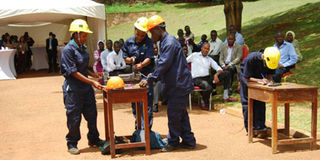Retraining needed for vocational trainers

Vocational students showcase their skills at an international skills development conference at Nakawa Vocational Institute in Kampala last year. Photo by Gillian Nantume
What you need to know:
- While releasing the results last month, Onesmus Oyesigye, the board’s executive secretary, noted that out of 22,398 candidates who sat for Business Diploma & Certificate Programmes and both National and Advanced Technical Programmes, 16,674 (74 per cent) successfully completed their programmes while 5,724 (26 per cent) were unable to prove their competence.
- The failure of 26 per cent of vocational students to pass the 2017 Uganda Business and Technical Examinations Board exams has been partly attributed to lack of the right competencies by some of their trainers raising concern that they, too, need to be retrained.
- Onesmus Oyesigye, the Uganda Business and Technical Examinations Board executive secretary, explains competency-based education and training principles.
- This kind of assessment takes three forms as Oyesigye explainOnesmus Oyesigye, the Uganda Business and Technical Examinations Board executive secretary, explains competency-based education and training principles.
The news that he had not made it in the Uganda Business and Technical Examinations Board (UBTEB) examinations reached him a few days after the 2017 results were released. “When they announced that the results were out, I was excited that I was finally done with my course, but also that my mother would finally have a breather from paying tuition. However, when I went to school to check for my results, I had not passed. I was both shocked and ashamed,” Moses, a student pursuing a Certificate in Motor Vehicle Mechanics sadly confides.
However, Moses is only one among 18 per cent of students who failed Motor Vehicle Technician Craft course, according to data by UBTEB.
Unfortunately, student failure is among the questions that come up every time national results, at every level are released. In the recently released vocational, technical and business examination results by UBTEB for example, a 26 per cent student failure was registered.
While releasing the results last month, Onesmus Oyesigye, the board’s executive secretary, noted that out of 22,398 candidates who sat for Business Diploma & Certificate Programmes and both National and Advanced Technical Programmes, 16,674 (74 per cent) successfully completed their programmes while 5,724 (26 per cent) were unable to prove their competence.
Furthermore, he noted in his speech that among the challenges they face as the examining body is poor performance of candidates in Mathematics, English and Computer Aided Drawing. This, he attributed to the instructors’ lack of competence in these very same fields.
In addressing this question, Oyesigye notes that it is not the mandate of UBTEB to retool instructors form the various institutions but institutes.
“The least we can do is train them in competency-based assessment. We have so far had a training of about 103 instructors in competence-based questions, and we plan to have more 500 assessors trained in the next financial year,” he explained adding that these are usually short trainings that last for four days.
But as UBTEB grapples with this challenge, it is as well faced with the challenge of enforcing competency-based assessments principles, right from institutional level since UBTEB exams are also based on the same principles.
Oyesigye says: “Unfortunately, the instructors and some lecturers in training institutions are still not yet retooled on competency-based Education and Training principles. This presents a serious mismatch in the training, delivery and assessment.”
In the deep end
Sharing how they are tackling this challenge as an institution, Soteri Nabeeta Kalanzi, the executive director Management Training and Advisory Centre, shares that they have embarked on periodic retooling of their staff to bridge this gap.
“We engage experts from different institutions including UBTEB and Kyambogo University. These experts periodically talk to our staff on; curriculum development, setting assessment questions and setting marking guides using the competency-based approach,” he says.
He agrees that sometimes as instructors they forget about these salient issues in the main course of training, thus the need for consistent training interventions.
“In the due course of the semester, we carry out what we call centralised setting where somebody who lacks competence in a certain field is able to share with their colleagues in the process of setting continuous assessments,” Nabeeta adds.
Results realised
Nabeeta acknowledges that training of instructors has produced results. “Compared to the old system where MTAC was marking its own, and the recently released results, performance of students has greatly improved. The output of the lecturers has significantly changed as well as the performance of the individual students,” he concludes.
In addition, Dr Hassan Wasswa Ssendagire, principal Multitech Business School, notes that as an institution, they are yet to implement the new competency-based curriculum. Nonetheless, he shares his plan on addressing the challenge of incompetent instructors.
“I know that the assessments are competency-based and are applied, but the instructors are still locked in the past. The strategy we shall be using as far as retooling is concerned, and I think the best way forward is to call people who joined UBTEB since its inception and have gained experience so that they can talk to our own instructors or even train them where possible in the necessary skills,” he notes.
But as UBTEB and different institutions grapple with this challenge, they are as well faced with the challenge of enforcing competency-based Assessments principles.
This kind of assessment takes three forms as Oyesigye explains. Firstly, students are practically assessed through observation as they go about their work. Second is the finish – or the level of quality of final products produced by students.
Can they for example be marketed or not? And lastly is the written exam where application of the acquired knowledge is assessed through ability of a student to answer scenario questions.
Whereas retooling of instructors in business, technical and vocational institutions is crucial to bettering student results, focus should also be put on equipping trainers during their training process to enrich them with the necessary skills.
Point of concern
Onesmus Oyesigye, the Uganda Business and Technical Examinations Board executive secretary, said among the challenges they faced as the examining body is poor performance of candidates in Mathematics, English and Computer Aided Drawing.
This, he attributed to the instructors’ lack of competent in those fields. “Unfortunately, the instructors and some lecturers in training institutions are still not yet retooled on Competency-based Education and Training principles. This presents a serious mismatch in the training, delivery and assessment.”
BASIC PRINCIPLES
Onesmus Oyesigye, the Uganda Business and Technical Examinations Board executive secretary, explains competency-based education and training principles. This kind of assessment takes three forms as Oyesigye explainOnesmus Oyesigye, the Uganda Business and Technical Examinations Board executive secretary, explains competency-based education and training principles.
This kind of assessment takes three forms as Oyesigye explains. Firstly, students are practically assessed through observation as they go about their work. s. Firstly, students are practically assessed through observation as they go about their work.
Second is the finish – or the level of quality of final products produced by students. Can they for example be marketed or not? And lastly is the written exam where application of the acquired knowledge is assessed through ability of a student to answer scenario questions.



